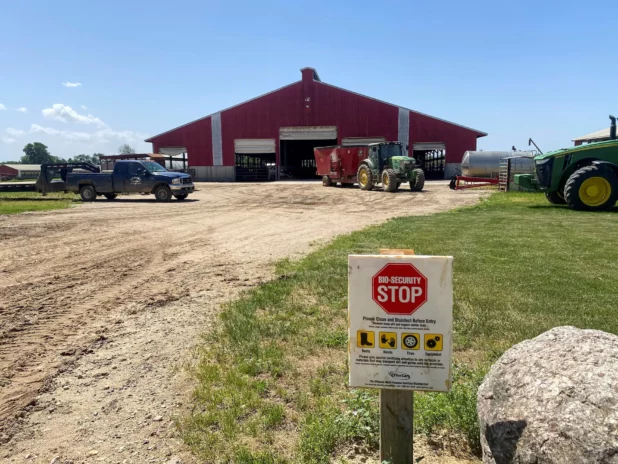They might do a big virus hoax before the election. With lockdowns and masks and vaccines and everything.
I don’t know.
How could I possibly know that?
It’s definitely possible.
You cannot predict the behaviors of this government. The people running it are too deranged.
Some dairy farmers are resisting Michigan’s nation-leading efforts to stop the spread of bird flu for fear their incomes will suffer from added costs and hurt rural America.
The government’s restrictions, which include tracking who comes and goes from farms, are rekindling unwanted memories of COVID-19 in Martin and other small towns in central Michigan.
The state has two of the four known cases in humans, all dairy workers, since federal authorities confirmed the world’s first case in U.S. cattle in late March. The state has tested more people than any of the 12 states with confirmed cases in cows, according to a Reuters survey of state health departments. Testing policies vary by state.
Public health experts fear the disease has the potential to turn into another pandemic just a few years after COVID-19. As those worries mount, the acceptance and success or failure of Michigan’s proactive response is being watched by other states looking for a roadmap that goes beyond federal containment recommendations.
More than a dozen interviews with Michigan producers, state health officials, researchers and industry groups, along with preliminary data, so far show limited dairy farmer participation in efforts to stem and study the virus. In some cases, calls from local health officials go unanswered, money for dairy farm research is left unclaimed, and workers still milk cows without extra protective gear.
Brian DeMann, a dairy farmer from Martin, Michigan, said the outbreak and state’s response recalls COVID-19. The 37-year-old believes Michigan’s rules to contain bird flu would be more widely accepted if they came as recommendations rather than requirements for farmers.
“Nobody knows if these things that we’re being told to do are going to stop it,” said DeMann, who echoed an uncertain view shared by other farmers. “Just like 2020, people didn’t like to be told what to do.”
This spring many U.S. dairy owners did not heed federal recommendations to offer more protective equipment to employees, according to farmers and workers. DeMann said he did not invest in new protective gear, such as masks, for his workers because it is unclear how the virus is spreading.
‘NEW THREAT’
Michigan’s agriculture department said it has up to 200 people responding to bird flu cases in poultry and cattle, including coordinating with USDA on outbreak investigations. Veterinarians in other states said they tracked Michigan’s cases to assess the risks for transmission.
“Michigan is doing a good job with their diagnostics and trying to identify where the disease is,” said Mike Martin, North Carolina’s state veterinarian.
Michigan’s outbreak in cows began after an infected Texas farm shipped cattle to Michigan in March before the virus was detected, according to USDA. Weeks later, a Michigan poultry farm also reported symptoms and tested positive. Whole genome sequencing suggested the virus spilled over from the dairy farm to the poultry flock.
USDA now thinks the virus has spread indirectly through people and vehicles moving on and off infected farms.
Michigan has plans to test dairy workers for signs of prior infections with first-in-the-nation blood testing.
The state has already monitored thousands of people for bird flu symptoms using a complex contact tracing system that texts them three times daily, said Chad Shaw, health officer for the Ionia County Health Department.
Some farmers remain reluctant to engage with local health authorities, though.
…
The Biden administration in late April began requiring lactating cows to test negative before being shipped over state lines.
Michigan went further and in May started requiring farms to keep logs of visitors, disinfect delivery trucks that could carry the virus, and take other safety steps. The state this month began requiring negative tests for non-lactating cows to be shown at fairs.
Colorado reported the nation’s fourth human case on July 3. The U.S. government awarded $176 million to Moderna to advance development of its bird flu vaccine for humans.
Two dozen companies are working on a vaccine for cattle, U.S Agriculture Secretary Tom Vilsack said, as about 140 herds nationally have tested positive.
It definitely does not sound good.
1 “alleged case of bird flu” in Michigan
They killed over 6.5 million chickens because of it IN LESS THAN 2 WEEKS.
Guess where these chickens were from that were killed? Organic, regenerative farms. Where they have space and a fresh “salad bar” of grass every day.
Chickens… pic.twitter.com/Bwqbs0lGkY
— Alex Clark (@yoalexrapz) June 14, 2024



